News for 07 June 2020
All the news for Sunday 7 June 2020
England Hockey releases anti-racism message after player incident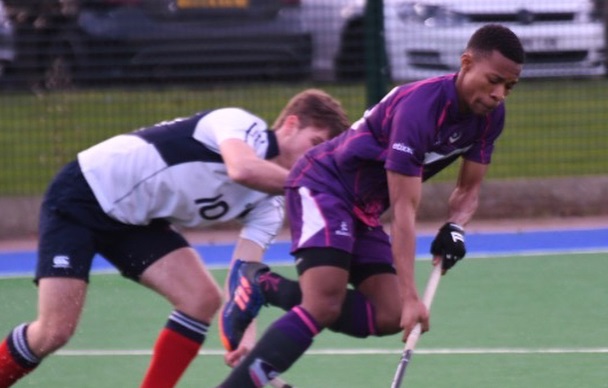
Tendo Kimuli, who this week stood up to racism after charting abuse on the pitch, revealed that England Hockey chief executive Nick Pink has spoken to him to discuss ways BAME people “can move forward as a community” in the sport.
Kimuli spoke out this week asking for anti-racism support from England Hockey after recalling unsavoury abuse on the pitch two years ago.
After Kimuli received a wealth of support on social media, the national governing body bowed to pressure on Friday when it released a welcome statement standing united against racism.
It said: “England Hockey are against discrimination of any kind and actively seeks to stamp out discriminative behaviour within our sport. Disrepute complaints, including incidents of racism, are dealt with very seriously by our disrepute complaints process.
“The experiences shared by members of the hockey community this week were extremely disappointing and sad to hear.”
Following the “surprise” call from England Hockey’s chief, Kimuli, 22, said that the lesson learned from speaking out this week had been that “you don’t need a large platform to help bring about change in whatever community you’re a part of.”
The student, who has represented England at under-18 and 21 level, added: “Keep speaking out and the right people will hear your voice.”
“Thank you to everyone who has messaged me and shown support over the course of the week.”
England Hockey said that any reports of abuse sent to the national governing body would be “investigated fully”.
However, THP can reveal that one national league match which resulted in two players subjected to racial abuse has yet to be dealt with after six months.
England Hockey last year set up a diversity and inclusion working group “with the purpose of creating a strategy that would lead our work in this area.”
The statement added: “Our belief is that initiatives we put in place need to be part of an over-riding strategy to ensure that their impact is long-lasting and sustainable.”
Please help keep independent journalism alive in these uncertain times. With the media industry affected by advertising, we are continuing to offer our coverage free until we return in print.
Ahead of the new season, please subscribe in print or in digital format. Subscriptions for clubs, schools and individuals.
The Hockey Paper
Alex Danson: ‘I always felt a real license to compete when I stepped on the field’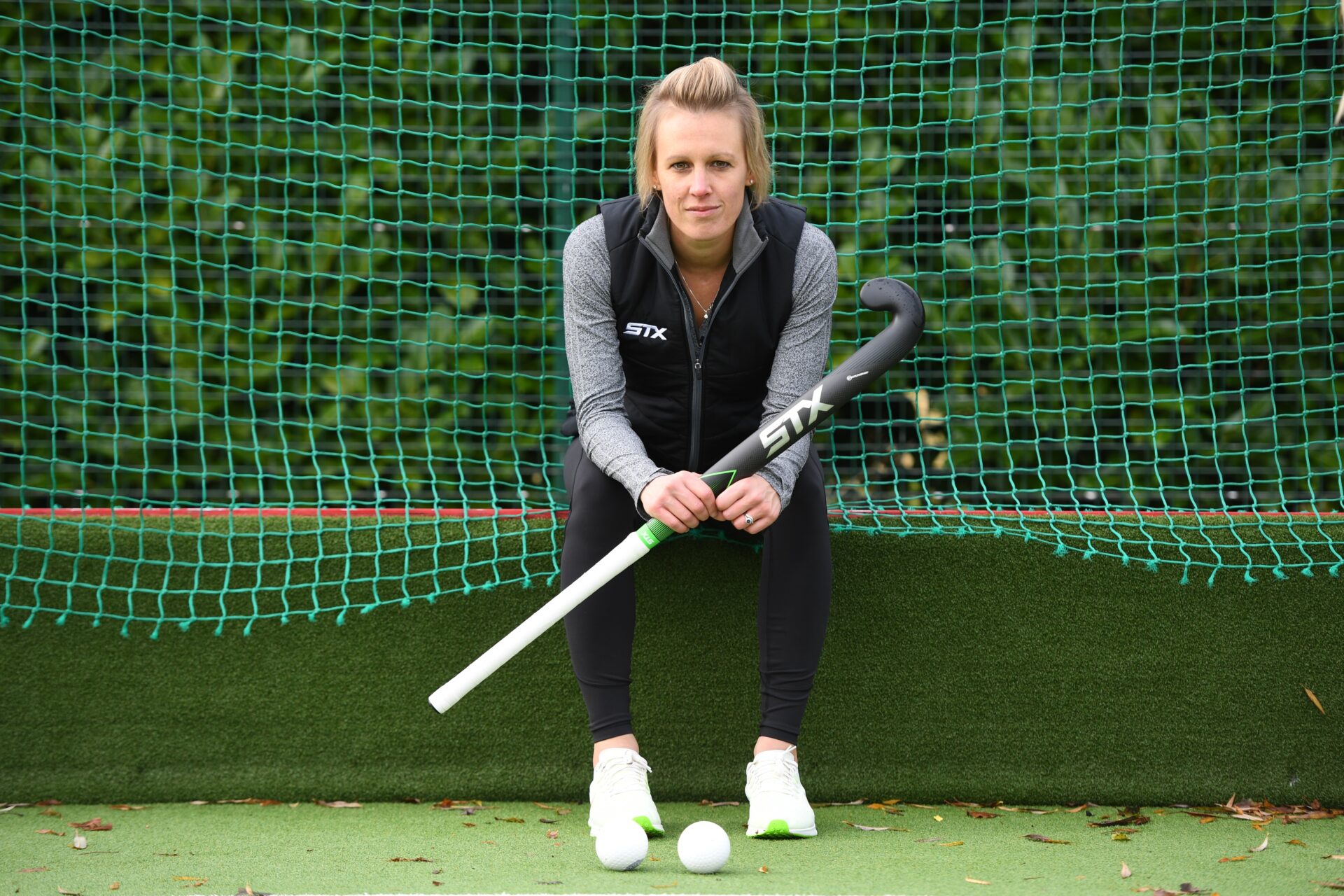
Great Britain hockey great Alex Danson-Bennett speaks exclusively to THP on a life in hockey and the golden road to the top
A COMPETITIVE WAVE
It was funny, one of the messages I had when I announced my retirement was from David Ralph [GB women’s assistant coach] who said ‘I’m glad I won’t ever have to umpire squads again!’. I suppose my tenacity on the pitch comes from having an older brother growing up, with a younger sister. I’ve just always felt a real license to compete when I stepped on the field. That’s the place. I would never run into anyone and challenge for anything down the street. But if there is a 50-50 ball there is license to go. The wave of competiveness was okay. It’s completely different from my life away from the field and I always enjoyed that.
LEARNING AT YOUNG AGE
My first England coach Trisha Heberle used to write handwritten letters to use with her feedback. She used to tell us that representing England wasn’t enough. That was instilled in me at a young age. I got that as a 16-year-old, that being here wasn’t a short journey. It was a long journey and we need to be better. She used to count down days until tournaments and it taught me the value of every day, every session and every decision you make is important. She gave me my first opportunity and that environment gave me the best start in hockey.
NOT ALWAYS ABOUT TALENT
I was at school when I joined the England programme. Others had jobs and were training at 5am. The big part of why I’ve enjoyed my career is that I’ve learned how to train well and hard, look after my body and to make good decisions. I learnt the best lesson as a 14-year-old going for England under-16s selection. We did a bleep test and I got 10.1. I was devastated, scrawny and wasn’t very strong. My hockey wasn’t great either.
I remember going home from Lilleshall at the end of the week and telling mum that they hadn’t made any cuts but had invited everyone back in six weeks. I think I must have woken up my parents every morning. They would cycle and I would run. I had by far the biggest improvement six weeks later. As a young athlete, it’s not always the most talented that are picked, but the hard grafters. I said to the coach ‘you can teach me all the skills, but I will work harder’. It’s the ethic behind working hard.
BE COMMITTED AS A FORWARD
There wasn’t really a strength and conditioning guidance as there is now. I just ran. M 16-year-old self then wouldn’t get in to the programme now as physically I wouldn’t be up to it. I don’t think there has been a 16-year-old since, because of the central programme. The game has changed. There was no self-pass rule and it wasn’t as quick when I started. The set up is different and the game has developed. I spent most of my childhood in front of a goal.
I didn’t have any fear as a forward. I almost trained that out of me. I learnt that the safest way was to be 100 per cent committed to something. The minute you hesitate or think too much you weren’t safe. My game evolved and adapted over time. As I got more comfortable on the ball, I dropped further into midfield, but my skill sets were better up front. If a youngster is looking on, I would say it’s about not being afraid of having a go on goal, putting yourself about in the circle or afraid to take a hit.
FUNDING WAS A GAME CHANGER
In my Gap Year I worked in a Harvester Restaurant. I would train in the morning and do different shift patterns. I then worked as a hockey coach for three years. In 2007, the team was split where half the team trained at Bisham and Loughborough. Funds weren’t great and there was talk of being a centralised programme.
We imagined what it would be like to play hockey as your job. Without question, funding was our game changer. In 2009, we started to understand what a culture was, how we wanted to form it and to have complete ownership of when we trained. You can’t do that on thin air. These were young women believing it was the right thing to do and making the decision to move their lives. It could have easily not happened if there was more resistance. Without doubt I don’t think we would have medalled in London without it.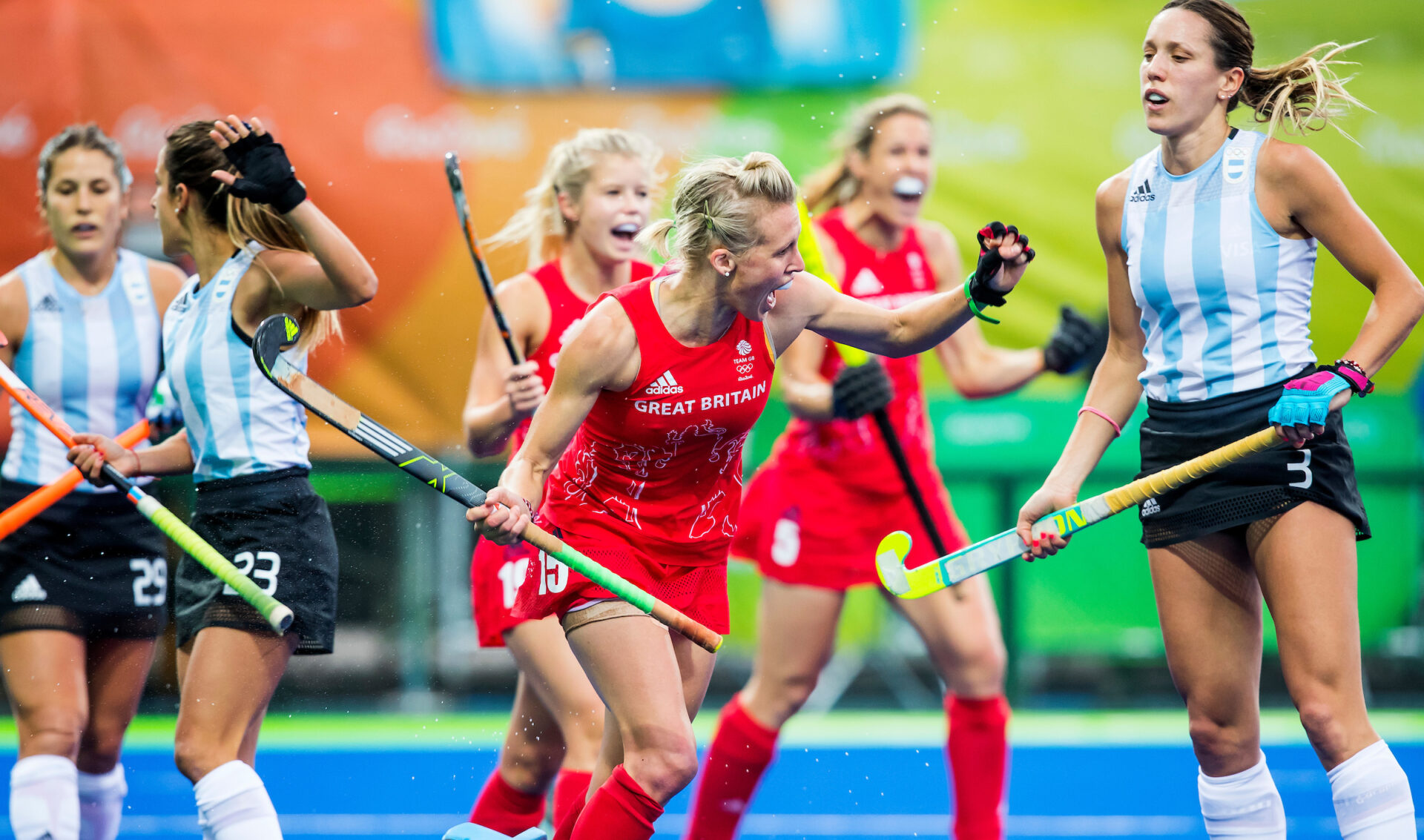
Turning fortunes: poor 2014 World Cup helped spur change PIC: Worldsportpics
A TEAM’S COMMON PURPOSE
The World Cup in 2014 was torturous. Every day didn’t get better. It was a hard period in time. No one was in a good place and there was lots of inner conflict. We needed to hit rock bottom as a squad to reform and we had failed coming 11th at a World Cup. There was pride but there was also expectation, especially being funded. Andrea Furst, our sports psychologist, supported us and designed and created a new set of values which would become our bedrock over the next few years. We now had a different set of learning circumstances.
The power of being together can work both ways. If you look at how to work effectively and understand your role in a team, have a common purpose, it can go the other way and be the best thing you’ve ever done. I remember our first game against Australia in Rio. We were leading 1-0 and the whistle went for half-time. We ran past the Australians as one team. It wasn’t an accident. It was designed for us to feel together. I loved the challenge of that.
2018: AN INCREDIBLE WORLD CUP
Things could have been so different in London. We didn’t play as well as we needed to do in those first two games. That’s why what we did in Valencia for Olympic qualifying (world ranked 7, winning seven in a row) and Rio (winning eight in a row) was so incredible. I don’t think we were under-prepared or if the occasion had an impact. There was so much change in the pools and there wasn’t as much certainty as in the tournaments where we were successful. It was, however, the most incredible World Cup.
The face of hockey has changed enormously because of it. The stadiums were filled, I wish we had finished further and I didn’t know it would be my last game (losing to Holland). But I still look back with really fond memories. We had suspicions about Danny [Kerry, potentially moving to the men] and who wasn’t talking about it in hockey? It was unfortunate but we didn’t know until after the tournament. That’s sport: coaches move and change. I remember when he did tell us I was disappointed as he is a very good coach. It is just the nature of the game.
ON RETIREMENT
I never thought how it would feel. I asumed it would be pretty rubbish but it was a lovely day and overwhelming. I was amazed that so many people took the time. It was so nice to hear from team-mates and it has instantly connected me to people. Players from other countries, that meant a lot to me. We play the same game and do the same thing. I didn’t know what to expect.
I got caught out in one of my retirement interviews. I was asked for my top three moments when I didn’t say Rio. You have to be careful. It’s not that it isn’t the pinnacle of winning anything, but it’s the other moments which were defining in terms of us getting there. I didn’t want to be disrespectful in what we had achieved! After all, there were so many people involved in the Rio programme.
Please help keep independent journalism alive in these uncertain times. With the media industry affected by advertising, we are continuing to offer our coverage free until we return in print.
Ahead of the new season, please subscribe in print or in digital format. Subscriptions for clubs, schools and individuals.
The Hockey Paper
O’Donoghue’s lockdown life busy with big plans and opportunity back in Ireland
Shane O’Donoghue in action for Dragons against Three Rock Rovers in the EHL in 2019. Pic: Frank Uijlenbroek / World Sport Pics
While lockdown has seen life slow down for most, Shane O’Donoghue is only getting busier and busier as his return to Ireland sees him kickstart a series of new ventures.
The record Irish international goalscorer has not only been appointed as the Glenanne player-coach and director of hockey but he is also getting an Irish franchise of the business coaching company, Mentally Fit, off the ground.
His return to Ireland came slightly earlier than expected as a result of the current pandemic; he had been looking forward to the endgame of the Belgian season and a potential playoffs push with KHC Dragons.
That was cut short just before St Patrick’s Day, enforcing his first extended break from a hockey pitch in God knows how long – well over a decade at least but maybe even since he took up the sport way back when.
O’Donoghue admits it has been hugely frustrating but, nonetheless, has found a series of different avenues to keep active in addition to his new jobs: among them, he has run sports psychology seminars with the Irish underage boys to presenting Team Ireland’s Dare to Believe online programmes.
“It’s been surprisingly busy,” he told The Hook. “Not being on the pitch is a major frustration. Hopefully things will fall into place in the next couple of months but we just don’t know.
“In one way, it’s a nice break as I have been in the Irish team since around 2010. You never get any kind of substantial break. But, across the board, people want to be back on the pitch, even just to knock a ball around.
“Hopefully this time away will give them a chance to spend time with family, catch up on work or whatever it is to then make them more hungry than ever to get back on the pitch and put their best foot forward. When that will be is uncertain which is the worrying aspect.”
The Mentally Fit franchise was a key outcome from his second spell in Belgium with Dragons. His first spell with the Antwerp club was fully focused on ramping up his game for Rio in a professional, full-time environment.
Heading back over in 2018, however, “had to be for more than just hockey” and a club connection to the company. Head-quartered in Brussels, Mentally Fit is a global organisation with over 70 coaches worldwide, offering a heavily sport-inspired coaching service to businesses – the client list has included the likes of Adidas, Heineken, Nike, pharmaceutical companies and Mastercard.
“Through Dragons, I met the founder and a couple of the senior people in the company; I fell in love with it immediately, loved the vibe and vision of the company.
“ Over time, I thought this could definitely work in Ireland. It’s unique and dynamic. From their end, they saw it as a chance to expand their wings and the franchise model is something they are pushing.”
Indeed, another franchise opened in Vietnam earlier in 2020 while others are already up and running in South Africa, Czech Republic, Romania and now Ireland.
“The way we coach and all the content is inspired by sport, validated by science and can be applicable to all businesses. That’s the mantra. We use a lot of sporting metaphors and analogies from high performance because the company, starting out, dealt a lot with teams like the Belgian Red Lions for the Beijing Olympics and then the Red Panthers for 2012.
“They have a wealth of experience with individual athletes and teams and then moved on to musicians and artists and so on. It was in that arena.”
O’Donoghue receiving the EYHL trophy from Simon McAllister in 2018. Pic: Adrian Boehm
For the moment, all sessions that the Olympian oversees are operated remotely but the aim is to create interactive and engaging sessions, judging the room and not sticking to an overly prescriptive format.
“You do your preparation but when you go in, you get a feel for the atmosphere and then almost navigate your way through it on the spot.
“It’s very creative and innovative and so whatever people put into it, is what they can get out of it which can be very different to other sessions which could be death by Powerpoint or follow a set structure for a workshop. We have a set of processes and then can attach our own story to it which can make that impact with managers, teams and CEOs in companies.”
It is the kind of work which dovetails with his studies, graduating in sports psychology in 2018 from UL. Through this, he started working with the Irish underage teams.
“That is something close to my heart and I am very passionate about working with like-minded athletes, ones who really want to excel. I started a company called Train the Brain – train the brain with Shane had a nice ring to it – working with some of the youth teams in Belgium, running a programme with a four different teams who are coming to the age of 16 to 19 when they are pushing for first team.
“It was about trying to give them some of the necessary skills for that pathway and strategies to fast-track their progress. So it’s that kind of thing I am bringing to the Irish Under-16 and 18 boys through a number of workshops.”
The dual-role with Glenanne completes the mix of roles he has taken on, initially being appointed for a two-year stint.
“it’s my boyhood club, one I look on fondly and has been part of my life since a very young age and admire what they have done. We had a very successful year in 2017-18 [winning the EYHL] between my two spells in Belgium and I am obviously very excited about it.
“It’s tricky enough to organise given the uncertainty about when the season will start so I am just reconnecting at the moment with guys I have known for a long time and putting things in place.
“It’s something I am very proud of to be the player-coach and also director of hockey, having an ambitious future view of how the club wants to be and wants to grow. We have a plan in place and I want to add what I can to get the most out of it.”
As for the Director of Hockey side of things, he will be looking to build on strong foundations after a fallow period for the club’s youth section.
“The youth section has done Trojan work in the last few years to try and build it up again to what it was and get it to a healthy level. It’s over the 100 mark which is much better and testament to that work.
“It is definitely a focus to see how we can raise the level and start to get players up to age 15 or 16 and then qualifying for adult hockey, incorporating them into the club and making them feel at home. It will be a challenge and there are a lot of clubs competing for the same talented youngsters so we will try to the best we can at the primary level with the schools we have many kids from.
“We have to be creative to try and get more and more boys and girls to come and play hockey as a whole and it will benefit the sport in Ireland.”
Sam O’Connor will be joining him back at the Glens from Beerschot in Belgium; it adds to the growing number of internationals returning to these shores for the 2020-21 season. To that end, Daragh Walsh, Lee Cole and Jeremy Duncan are also likely to be back playing in Ireland.
“Sam was disappointed not to finish off his first season in Belgium properly; he was welcomed into a really nice club over there but he is excited about coming back. Again, it’s his boyhood club and we are both looking forward to it.
“The new regime with Mark Tumilty as national coach based in Ireland will have a big positive impact in the standard of play for clubs in the EY with that constant eye watching your games so guys are excited about putting their best foot forward.”
“From the club point of view, it’s a massive boost to get him back after a year playing professionally alongside one of the best centre backs [Arthur de Sloover] for a year.”
The Hook
Height is not the Harte of the matter
PETALING JAYA: Hockey teams usually prefer tall players to man the goalpost as they can cover lots of space.
So it does not come as a surprise that goalkeepers like David Harte (pic) of Ireland, Pirmin Blaak (Holland), Andrew Charter (Australia) and Vincent Vanasch (Belgium), all of whom stand over six feet, are some of the best in the game.
However, height alone does not determine the capability of a goalkeeper, says Harte.
In a one-and-half-hour live chat with fans via the Malaysian Hockey Confederation (MHC) Facebook page on Friday, Harte shared that while height mattered, it was his style of play that sets him apart from the rest.
The 32-year-old, who was voted the best goalkeeper by the International Hockey Federation (FIH) in 2015 and 2016, is popular in Malaysia, having played for Universiti Kuala Lumpur (UniKL) in the Malaysia Hockey League (MHL) for the past four years.
Standing at 1.96m, he has featured for Ireland 215 times since 2006, helped UniKL to win the league, Charity Shield and overall Cup treble in the MHL in February.
“A goalkeeper’s body does not need to be a specific type. One has to use his attribute to the best of his ability. I do use my height, but I have speed too, ” he said during the chat, which was moderated by his UniKL coach Arul Selvaraj.
“You need to have strength and power behind those limbs. To me, goalkeepers around the world have their own styles, and I have mine.
“It’s about having your own flair, how you move, how you slide. You repeat them over and over to get to your best shape. Goalkeeping is a specialised position, and you need hours of training to be good at it.”
Harte attributed his rise to coaches like Nigel Henderson and Martijn Driver as they have worked on his strengths and allowed him to be himself on the pitch.
Former national goalkeeper S. Kumar, who was also part of the live chat, said he relied on discipline and technique to become one of the best in the world. He has represented Malaysia 323 times over two decades from 1999-2019.
The Tampin-born player was voted the best player in Asia in 2010 and has also won the best keeper award in the Asia Cup in Chennai in 2009 and in the World League Semi-Finals in London in 2017.
“Reflexes and concentration are essential. Whether you are tall or short, if you have those traits, you can go far, ” said the 1.79m-tall goalkeeper.
“A good goalkeeper will give confidence to the team, and I try to instil that. I was able to perform at an elite level for a long time, even until my 40s because of discipline. I do not smoke, drink, and always keep myself in shape, ” added the 41-year-old, who will be part of the national junior hockey coaching team.
The Star of Malaysia
National juniors to train despite Sultan of Johor Cup cancellation
By Jugjet Singh
THE Malaysian national junior hockey team have nothing to look forward to this year following the cancellation of the Sultan of Johor Cup amid the Covid-19 pandemic.
However, the boys' team, under coach Wallace Tan, will still gather, when the government allows field training, to prepare for next year's Junior Asia Cup, a qualifier for the Junior World Cup in India.
The boys and girls' Junior Asia Cups in Bangladesh and Japan this year have been suspended.
The Asian Hockey Federation (AHF) have yet to finalise new dates for both tournaments.
However, the AHF face a tricky situation as the International Hockey Federation (FIH) require all continents to confirm their teams for next year's Junior World Cup by the end of this year.
But the FIH are expected to delay it as the Junior World Cup is scheduled only late next year.
"Although junior tournaments have been cancelled this year, our trainees will still train.
"They need to keep in shape for the boys and girls' Junior Asia Cups, likely early next year," said Malaysian Hockey Confederation (MHC) president Datuk Seri Subahan Kamal.
New Straits Times
Punch shots and the ramp: Hockey is losing out to cricket’s magic hands
By Shahbaz M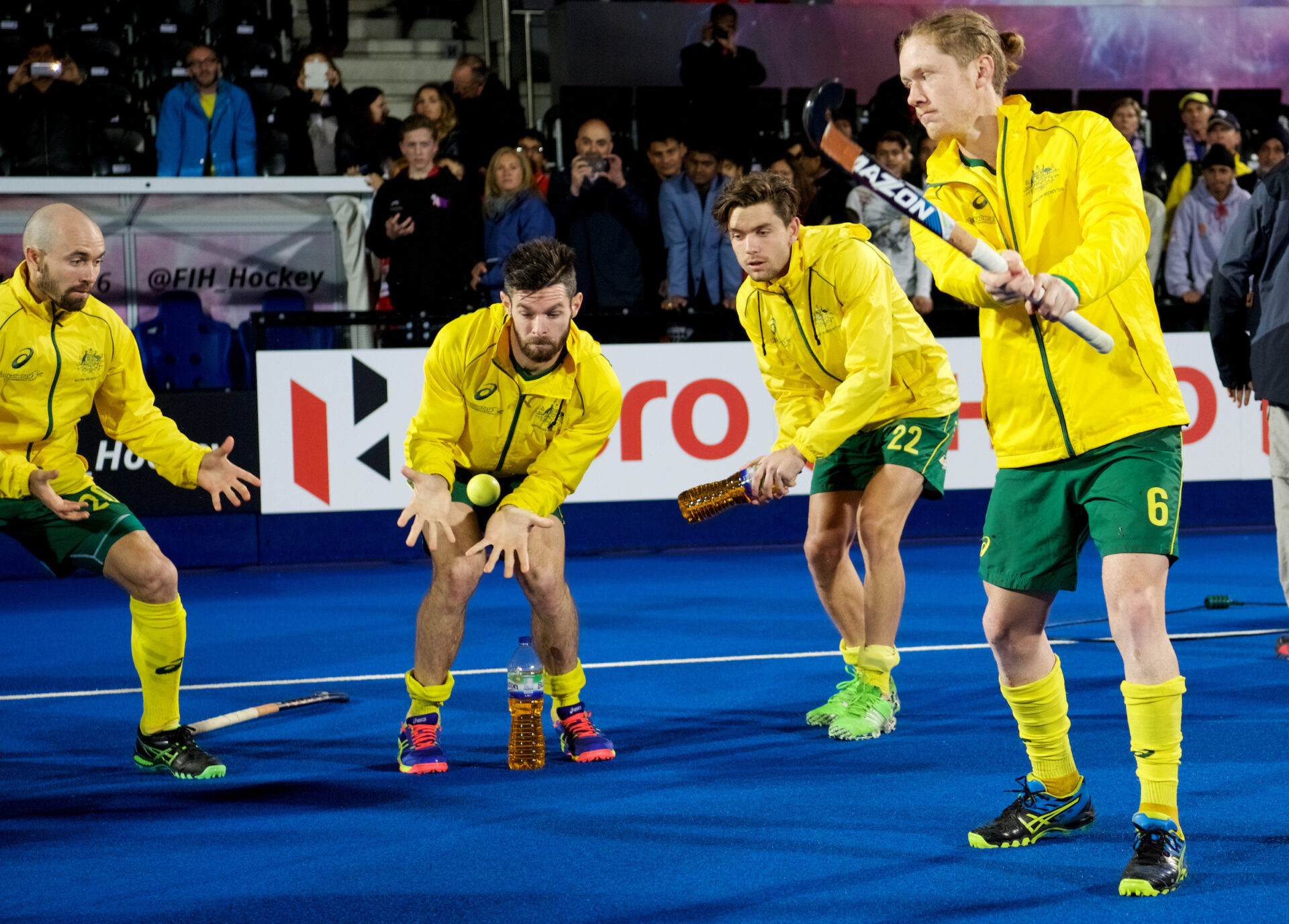
The Kookaburras warm up with a spot of cricket PIC: World Sport Pics
Just before last summer’s Cricket World Cup, Jonny Bairstow used the sport’s showpiece event to pay ode to hockey.
The English opener credited the hours of toil on the hockey pitch in Leeds as a teenager for his effective shot-making on the cricket field.
Here’s what Bairstow, a defender, wrote in The Telegraph: “I owe the power in my shots to my youth playing hockey. I use the same whip action of the wrists to generate energy through the ball. If you watch Jason Roy you will see he has a nice, big flowing follow through on his shots. But I will punch the ball, with very little follow through, a bit like playing a hockey shot with a snap.”
Among a lot of things that have been written and spoken since the tournament began, this bit stood has out for me for the simple reason that hockey often flies under the radar in terms of how much it contributes to other sports philosophically and ideologically.
For instance, in the 2014 FIFA World Cup, Louis van Gaal had two professional hockey players – Hans Jorritsma and Max Reckers as his strategy analysts. It wasn’t the first time Holland’s favourite sport had turned to its second-favourite sport for inspiration. But hockey’s intellectual contribution to other sports is not spoken about much.
So Bairstow’s comments feel like a sentimental tribute to the first coach. Who knows, his words might inspire a school-going kid to pick up a hockey stick!
Bairstow, of course, isn’t the only player who has executed the skills learnt on a hockey field to flourish as a cricketer. Jos Buttler’s signature shot, the ramp, has its origins in hockey as well. The wicketkeeper-batsman was at a local hockey match when he saw a forward trying to deflect a long pass past the goalkeeper by simply putting his stick in the path of the ball.
A former hockey player himself, Buttler was easily able to breakdown the striker’s complex movements, especially changing the angle of the hockey stick at the last second. He fine-tuned the technique and developed it till the time he mastered what later came to be known as the ramp shot.
The slap shot that former India captain MS Dhoni played so masterfully in his prime was inspired from his hockey-playing days on dusty, pebble-laden ground in Ranchi, his hometown in eastern state of Jharkhand. Like most school children, Dhoni grew up playing multiple sports. He excelled as a footballer, was an average cricketer to begin with and was a bits-and-pieces hockey player. What separated him, though, was his ability to borrow the skills learnt in one sport and implementing them while playing another – like the slap shot.
You wonder how things would’ve been if the likes of Bairstow and Dhoni would have gone on to make a career in hockey and not in cricket. Would they have raised the profiles of their respective hockey teams in the same manner? Maybe. Maybe not. It’s unfortunate that gifted players like them, who transcended their sport, did not find it worthy to make a career in hockey.
That leads me to another question, one that I often find myself asking others: Is hockey doing enough to retain talent at a young age? Unfortunately, not enough research has been done on this subject to arrive at a definite conclusion but through first-hand and anecdotal accounts, you get a sense that not enough is being done.
A thesis by The University of Birmingham student Joanna Turnbull on factors that affect talent identification in hockey identifies family, school and clubs as three key influencers. Ms Turnbull’s paper, prepared in 2011, focuses on the English game. If her parameters are applied to rest of the world, few countries come out shining.
All Asian countries fail miserably on all three counts for varying reasons – in India, school-level hockey is virtually dead; in Pakistan the sport itself is on a life support; Malaysia is trying but lacks proper structures which then leads to a mass exodus of players after school level while South Korea seems to have run out of money and patience to revive hockey. None of these countries have a club structure to boast of.
A lot of young children play hockey in South Africa, Australia and England. But they are mostly the ones who attend grammar and state schools and it is one of several sports they play. Playing multiple sports while growing up is indeed beneficial for a child but the general trend is that when it eventually comes to choosing one sport, hockey isn’t always the preferred choice.
Again, the reasons are many – if you’re a South African, ambition/motivation can be a decisive factor since Olympic participation of the hockey team is always a big question mark. A common problem for all hockey-playing nations is the lack of financial security. The amateur nature of the sport – the fact that there are still many players who pay to play – is the biggest deterrent and forces a lot of talented players to migrate to other sports where their future isn’t so uncertain. Ultimately, we are often left with players who stick to the sport only because someone from their family has played it.
That, then, makes me wonder: should hockey aspire to be a big, mass sport – like football, for instance – or is it better of being low-key and family oriented? I know where I stand in this debate, which is also the subject of my next column. Till that appears, I’ll leave you all to ponder over it.
Please help keep independent journalism alive in these uncertain times. With the media industry affected by advertising, we are continuing to offer our coverage free until we return in print.
Ahead of the new season, please subscribe in print or in digital format. Subscriptions for clubs, schools and individuals.
The Hockey Paper
England Hockey Awards 2020 Winners
England Hockey Awards 2018
Thank you to everyone who joined us for our online awards ceremony. It was a little bit different to normal, but we hope you all still enjoyed yourselves and had a fantastic night.
Please share your photos, videos and screenshots with us and to all our winners, a HUGE congratulations.
Please do send us your thank you and acceptance video, we would love to hear from you. #EHAwards2020
2020 England Hockey Awards Winners:
Men’s Senior Performance Player – David Ames
Men’s Emerging Performance Player – Ollie Payne
Investec Women’s Senior Performance Player – Laura Unsworth
Investec Women’s Emerging Performance Player – Lily Walker
Innovation – Tunbridge Wells Flyerz
Vitality Rising Star - Daniel Bridges
Spirit of Hockey - Andy Richardson
Coach of the Year – Angie Cottee
Official of the Year - Anthony Bridge
Lifetime Achievement - John Holbrook
Vitality Hockey Maker of the Year - Sandy Sutton
Howden Men’s Team of the Year - Okehampton Mens 1s
Investec Women’s Team of the Year - Buckingham Ladies HC Indoor Team
Notts Sport Club of the Year – Norton Hockey Club
England Hockey Board Media release
When Balbir Singh Sr offered namaz with Aslam Sher Khan
Former India captain pays tribute to the hockey legend, shares memories from the victorious 1975 World Cup campaign on Express Sports podcast.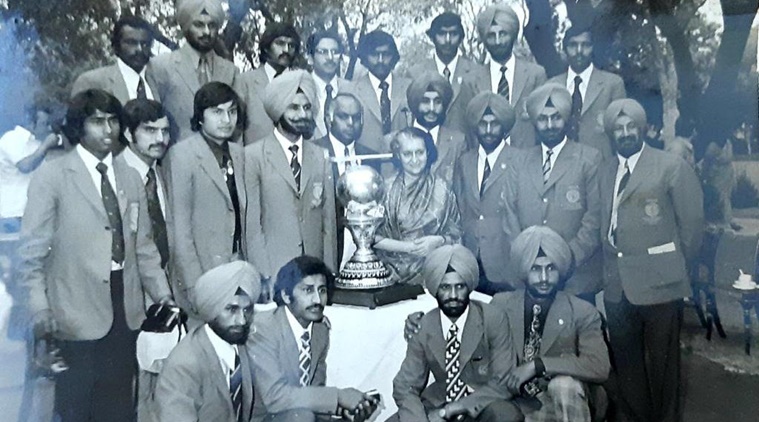
The victorious Indian team with Prime Minister Indira Gandhi after their arrival in New Delhi. Aslam Sher Khan is third from the left in the second row. (Special Arrangement)
Former India captain and Olympian Aslam Sher Khan recalled the day of the final of the 1975 hockey World Cup, when team manager Balbir Singh Senior travelled to a mosque to offer namaz with him.
Speaking on the Express Sports podcast, Aslam shared memories of his time with the three-time Olympic gold medallist Balbir, who passed away on May 25. The lone Muslim in the Indian team, Aslam was preparing for a trip to Kuala Lumpur mosque — in a bus also carrying the Pakistan team members — when Balbir stepped into his room.
“‘Beta I’ll also offer namaz with you’, he said. It was our strength that Allah, Waheguru, Bhagwan everybody came together for us. We went to the mosque, (Balbir) was wearing a red turban… It had an effect on the Pakistan team,” Aslam said.
“Their great hockey player Abdul Rashid Jr turned to his teammates and said, ‘now, it’s tough for Pakistan to win’. Everybody asked, ‘why’? Abdul said, ‘Ab jab sardar pehli baar namaz padenge, toh naturally allah unki pehle sunenge. (Now when a Sikh will offer namaz for the first time, god will listen to his prayers first).”
India beat Pakistan 2-1 to win their only World Cup title.
Aslam further paid tribute to the hockey legend, calling him an “outstanding person off the field” who “wanted to put together a united Indian team.”
“(Balbir’s) playing career is part of the golden history of Indian hockey, but a person is outstanding when he excels both on and off the field. As a manager, he wanted to put together a united Indian team, with the strength of all religions put together. He worked on that during the training camp at Chandigarh itself. He built a prayer room in the Chandigarh hostel for all religions,” Aslam said.
“When we were stepping on the field… somebody was from Punjab, someone from Tamil Nadu, Karnataka, Bhopal… Balbir still had to face that thing in Kuala Lumpur once, when I was out of the team.”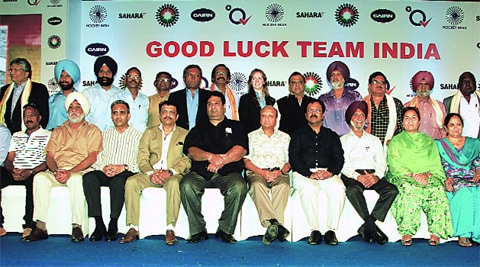
Members of the 1975 World Cup winning team at a felicitation.
Khan did not get a chance to play in the league matches of the 1975 World Cup. During the semifinal against Malaysia, the Indian team was trailing and manager Dosanjh and coach Bodhi were involved in an animated discussion over whether to replace Michael Kindo with Khan. Dosanjh’s argument prevailed and he held Khan’s face in his hands and said, “ja beta, ab tera khuda hi bharat ko bacha sakta hai”.
Two minutes later, Khan’s goal through a penalty corner ensured the match was tied 2-2 and went into extra time where Harcharan Singh scored the winner.
“Ultimately, he knew that I had a role to play. When it was time in semifinal, he received the signal from the powers above. Ki yahan ek musalman ladke ki zarurat hai, jo khuda ka naam leke bhi maidan pe utre (a Muslim player is needed here, who can step on the field praying to his God).”
Indian Express